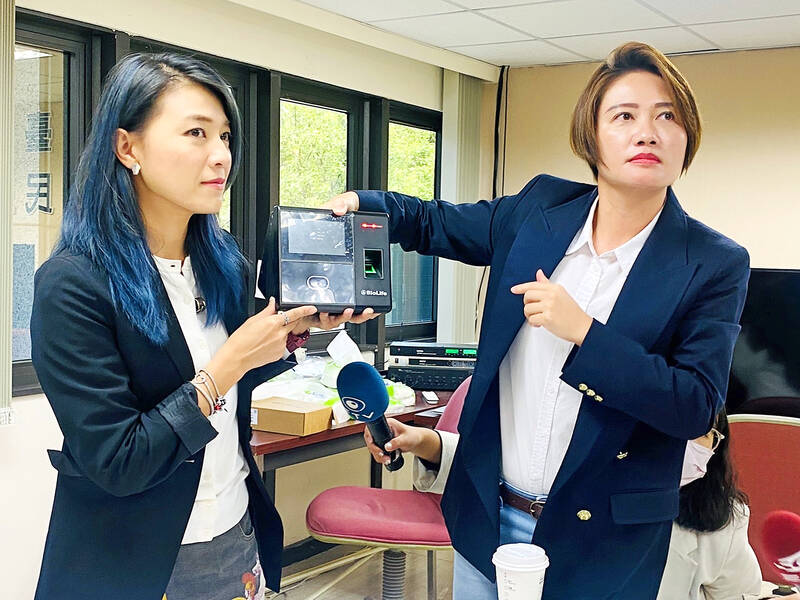The Taipei City Government yesterday vowed to ensure all municipal devices are provided by secure sources, after city councilors alleged that 19 municipal offices used attendance machines which were made or assembled in China and Thailand, and had fingerprint collection and facial recognition capabilities.
Eight agencies procured Chinese-made machines, while 11 agencies bought machines that were assembled in Thailand, but are mainly made of components produced in China, Democratic Progressive Party (DPP) Taipei City Councilor Lin Yen-feng (林延鳳) told a news conference at Taipei City Hall.
The city’s use of those attendance machines is a breach of the cybersecurity guidelines issued by the central government, she said, adding that the Thai machines were on a blacklist on the National Communications Commission’s Web site.

Photo: Yang Hsin-hui, Taipei Times
Forty Taipei City Government offices and agencies bought new biometric attendance machines after the municipality ordered measures to be taken to stop city employees from cheating by having colleagues clock in for them, she added.
Although the municipal government said the machines were connected to the agencies’ internal network and likely did not pose a cybersecurity threat, Lin said she disagreed with this assessment.
The central government’s guidelines had urged public bureaucratic organizations to be cautious when ordering digital products and services, she added.
The failure of the Taipei City Government to follow cybersecurity standards called into question the security of city residents’ personal information in municipal systems, DPP Taipei City Councilor Yen Juo-fang (顏若芳) said.
The city’s procurement process must be reviewed to weed out Chinese-made technology products assembled in a third country and all biometric attendance systems should be checked for their place of origin, Yen said.
A representative of the Taipei Department of Information Technology at the news conference did not dispute the city councilor’s allegations.
The agency would intensify its efforts on supervising city offices’ compliance with regulations, the representative said.
City agencies would submit all procurement plans to the department for evaluation and approval to help avoid the problem, they added.
A representative of the Taipei Public Works Department said the machines might have slipped through the cracks, as the city government did not require subordinate offices to write contracts for small-volume purchases.
The Taipei Department of Information Technology is launching a probe into any potential harm to cybersecurity caused by the attendance machines, department commissioner Chao Shih-lung (趙式隆) said.

Taiwanese can file complaints with the Tourism Administration to report travel agencies if their activities caused termination of a person’s citizenship, Mainland Affairs Council Minister Chiu Chui-cheng (邱垂正) said yesterday, after a podcaster highlighted a case in which a person’s citizenship was canceled for receiving a single-use Chinese passport to enter Russia. The council is aware of incidents in which people who signed up through Chinese travel agencies for tours of Russia were told they could obtain Russian visas and fast-track border clearance, Chiu told reporters on the sidelines of an event in Taipei. However, the travel agencies actually applied

Japanese footwear brand Onitsuka Tiger today issued a public apology and said it has suspended an employee amid allegations that the staff member discriminated against a Vietnamese customer at its Taipei 101 store. Posting on the social media platform Threads yesterday, a user said that an employee at the store said that “those shoes are very expensive” when her friend, who is a migrant worker from Vietnam, asked for assistance. The employee then ignored her until she asked again, to which she replied: "We don't have a size 37." The post had amassed nearly 26,000 likes and 916 comments as of this

New measures aimed at making Taiwan more attractive to foreign professionals came into effect this month, the National Development Council said yesterday. Among the changes, international students at Taiwanese universities would be able to work in Taiwan without a work permit in the two years after they graduate, explainer materials provided by the council said. In addition, foreign nationals who graduated from one of the world’s top 200 universities within the past five years can also apply for a two-year open work permit. Previously, those graduates would have needed to apply for a work permit using point-based criteria or have a Taiwanese company

The Shilin District Prosecutors’ Office yesterday indicted two Taiwanese and issued a wanted notice for Pete Liu (劉作虎), founder of Shenzhen-based smartphone manufacturer OnePlus Technology Co (萬普拉斯科技), for allegedly contravening the Act Governing Relations Between the People of the Taiwan Area and the Mainland Area (臺灣地區與大陸地區人民關係條例) by poaching 70 engineers in Taiwan. Liu allegedly traveled to Taiwan at the end of 2014 and met with a Taiwanese man surnamed Lin (林) to discuss establishing a mobile software research and development (R&D) team in Taiwan, prosecutors said. Without approval from the government, Lin, following Liu’s instructions, recruited more than 70 software